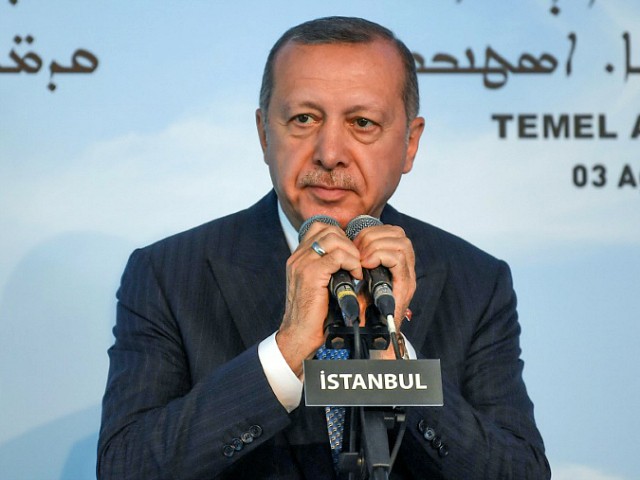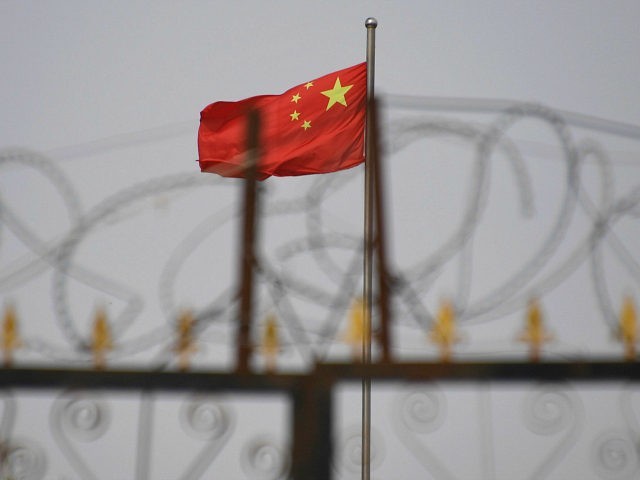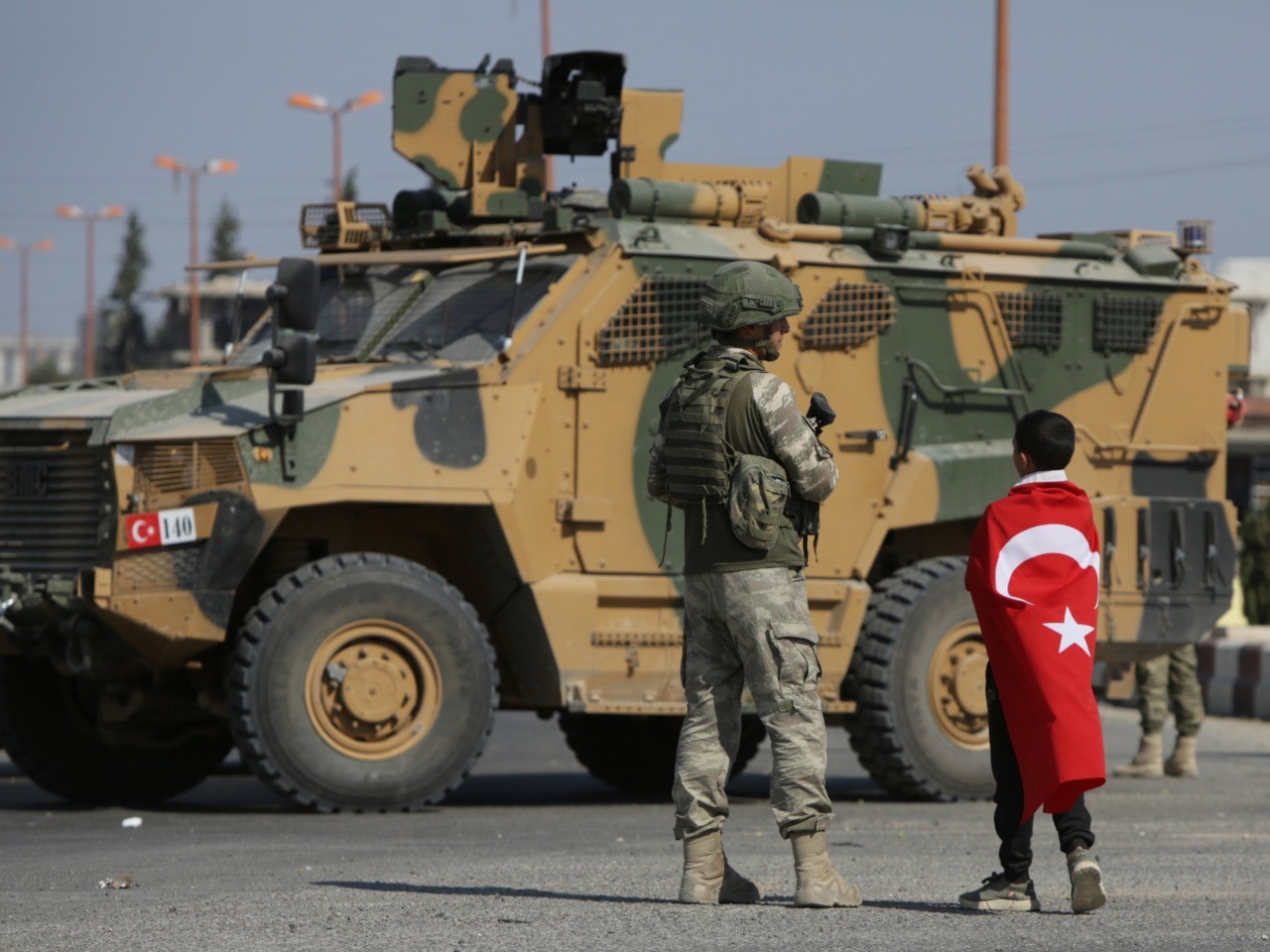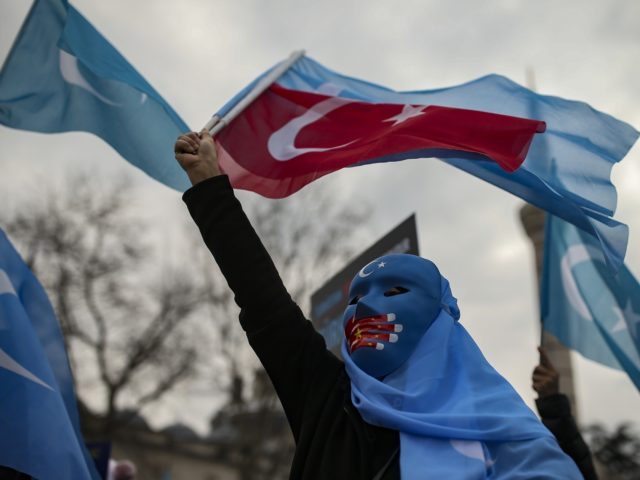The Turkish government muted its criticism of China’s horrendous abuse of the Uyghur Muslims on Wednesday, as Turkish Foreign Minister Mevlut Cavusoglu conveyed some vague “views, expectations and sensitivities” to Chinese Foreign Minister Wang Yi but stressed Turkey’s full respect for China’s “sovereignty.”
Radio Free Europe (RFE) noted on Thursday that Turkish President Recep Tayyip Ergodan, who normally styles himself as a champion of Islam and fierce defender of all Turkic peoples, “has been accused of largely remaining silent on the plight of Uyghurs due to economic ties and other interests with the world’s second largest economy.”
Turkey has about $24 billion in annual trade with China, including a growing volume of Turkish agricultural exports.
The Uyghurs are the most oppressed Turkic minority in the world. Their language, culture, and religious practices have roots in a thousand-year-old Turkish fiefdom.
Uyghur separatists, who are frequently invoked by China as a security threat that justifies turning the Uyghur homeland into a maze of concentration camps and surveillance systems, believe their land should be part of an independent country called “East Turkestan.” Turkey is home to about 50,000 Uyghurs, the largest Uyghur community outside Central Asia.
China’s genocidal campaign against the Uyghurs includes diluting their ethnicity by settling their land with Han Chinese while suppressing the Uyghur birth rate. Meanwhile, the concentration camps of Xinjiang vigorously attack the Muslim religion, reprogramming the Uyghurs to worship Chinese dictator Xi Jinping and Communist ideology instead.
Erdogan, a belligerent autocrat who once slandered European leaders as “Nazis” because they wouldn’t let his operatives hold a political rally, has done little about the genocide in Xinjiang except politely ask his opposite number Xi Jinping to go a bit easier on the Uyghurs. Even that was too much for China, as Wang lectured Cavusoglu about butting out of China’s “sovereignty, security, and development interests” when they met in Beijing this week.

Turkish President Recep Tayyip Erdogan holds the microphones as he delivers a speech. (OZAN KOSE/AFP/Getty Images)
According to the Chinese Foreign Ministry, Wang insisted China and Turkey should “refrain from participating in activities against each other on international occasions” while working to “enhance mutual understanding through bilateral channels on differences in historical and ethnic issues.”
In other words, Wang told Cavusoglu that further complaints about the Uyghurs should be discreetly slipped into Beijing’s suggestion box without raising a public fuss.
The South China Morning Post (SCMP) suspected China was perturbed by Erdogan’s plans to pump up the Organization of Turkic States (OTS), an Istanbul-based coalition that includes Azerbaijan, Kazakhstan, Kyrgyzstan, and Uzbekistan – countries where the Uyghurs have roots and where Uyghurs often flee if they can manage to get past Chinese border patrols.
The Organization was founded under a different name in 2009 but was rebranded and revitalized late last year, announcing itself as a heavyweight political contender in the region and gaining some economic muscle with the establishment of a Turkic Investment Fund. At a group summit in November, Turkmenistan was inducted as an observer nation, and plans were made to invite nations from outside the region as observers in the future.
“All sovereign and independent Turkic states in the world – Azerbaijan, Kazakhstan, Kyrgyzstan, Turkey, Turkmenistan, Uzbekistan and Hungary, which also considers itself part of the Turkic world – are united under the common flag of the Organization of Turkic States,” declared Secretary-General Baghdad Amreyev after the November summit.
The resurgent OTS could find itself at odds with the U.S., European Union, and Russia on various issues, but China appears particularly apprehensive that the OTS will have something to say about the Uyghurs. Several OTS members are clients of China’s Belt and Road Initiative (BRI) and might feel some domestic pressure to speak up, or else their leaders might be accused of taking payoffs from Beijing to abandon the Uyghurs.

(GREG BAKER/AFP/Getty Images)
On Thursday, China’s state-run Global Times told Erdogan to swallow whatever discomfort he might feel about Xinjiang, dismiss the cries of human-rights activists as Western disinformation, and make common cause with China on “counter-terrorism” issues:
The essence of issues around China’s Xinjiang Uygur Autonomous Region is about countering terrorism and separatism and the Chinese government has the responsibility to defend the region’s security and stability, Wang Yi made the remarks during his talks with Cavusoglu on Wednesday, expressing hope that Turkey and other Islamic countries understand and support China’s stance on topics of the Xinjiang region.
Wang met with Turkish Foreign Minister Mevlüt Cavusoglu in Wuxi, East China’s Jiangsu Province, on Wednesday and they had candid exchanges on China-Turkey relations, bilateral cooperation and global and regional issues of shared concerns, Wang Wenbin, spokesperson of the Foreign Ministry said at a press conference on Thursday.
Wang Yi also had deep communication with Cavusoglu about China’s Xinjiang region. The Chinese FM noted that the US and some Western countries have spread numerous disinformation about the region to disturb China’s development.
The Global Times did not mention them explicitly, but the editorial implied similarities between China’s clash with Uyghur separatists and Erdogan’s running battle with the PKK, a Kurdish separatist group. The Global Times described Xinjiang’s “East Turkestan Islamic Movement” (ETIM), a terrorist group the U.S. government has concluded does not exist, in exactly the same terms Erdogan’s government uses for the PKK.
Regional strategic analysts have noted Turkey’s ties to China and Russia improved considerably after Europe and the United States supported Kurdish militias during the Syrian civil war and the battle against the Islamic State.

TOPSHOT – Turkish soldiers patrol the northern Syrian Kurdish town of Tal Abyad, on the border between Syria and Turkey, on October 23, 2019. (Photo by BAKR ALKASEM/AFP via Getty Images)
Turkey’s reservations about the abuse of the Uyghurs have been an impediment to its realignment toward China. The revamping of the OTS might have signaled Beijing that Turkey was ready to play a bit rougher – The Diplomat noticed in December that the OTS announced its new name and expanded membership on November 12, an important anniversary for the Xinjiang Uyghur Autonomous Region. A few days later, Erdogan made a point of getting himself photographed standing in front of a “Map of the Turkish World” that included Xinjiang.
China responded by playing a little hardball of its own, lobbing charges of human rights abuse against Turkey’s military mission against Kurdish militias in Syria. Subsequent rhetorical exchanges between Chinese and Turkish officials made it clear the Chinese want Turkey to think about the Kurds every time it thinks about the Uyghurs.
“The Chinese actions sent a clear message to Turkey that China will retaliate if Ankara continues to meddle in the Uyghur issue. China’s playbook is simple: If Ankara continues to criticize China over the Uyghur issue, then Beijing will bring Turkey’s actions in Iraq and Syria to the international agenda,” The Diplomat concluded.

COMMENTS
Please let us know if you're having issues with commenting.